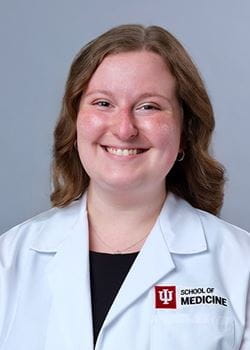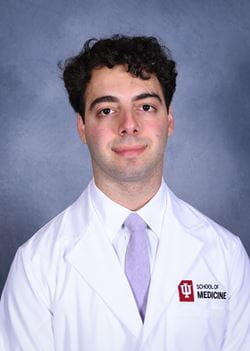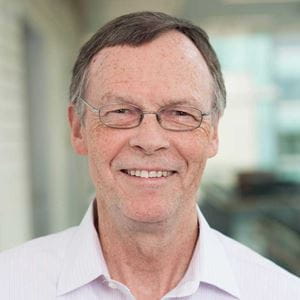When Emily Kaderabek was considering her options for medical school, one thing made the Indiana University School of Medicine stand out: a dual degree program that would allow her to add a master’s in public health without increasing her total time in medical school.
The field of public health is an “upstream” approach on the quest to improve the nation’s health — intervening at the community level to prevent illnesses from happening in the first place. In partnership with the IU Richard M. Fairbanks School of Public Health, the School of Medicine has launched a four-year MD/MPH program allowing medical students to stay on track for graduation while gaining extra knowledge in public health.
“Having more physicians educated in both medicine and public health facilitates the integration of medical and social health care,” said Amelia Hurt, director of student success at the School of Public Health.
Kaderabek, a Chicago area native, is now part of the program’s first cohort.
“It has been a goal of mine to do community-engaged research, which is something I think is needed especially among older adult populations and among the diverse populations we work with (in medicine),” said Kaderabek, who studied neuroscience at Boston College. “A background in public health will really help me bridge some of those gaps between research and the communities we hope to learn from — to really make sure that research is a two-way street.”
 Her interest in aging developed from experiences in childhood as she witnessed the decline of her grandmother, who lived with Kaderabek’s family during her final years of life.
Her interest in aging developed from experiences in childhood as she witnessed the decline of her grandmother, who lived with Kaderabek’s family during her final years of life.
“We had folks from palliative care and hospice who were in our home a few days a week,” Kaderabek recalled. “I just remember how grateful I was that we were able to be guided through that journey and weren’t left to do it on our own.”
Working at a skilled nursing facility during college, Kaderabek noticed that wasn’t the case for some people as they experienced the physical and cognitive effects of aging. Those without strong support systems had worse health outcomes.
“My big inspiration for going into not just medical school but specifically into public health is to understand where the gaps are,” she said. “How can we build up patients and their communities to feel supported as they navigate their health care?”
Quicker path to becoming a physician leader
Today’s medical students are seeking more information about social drivers of health and social barriers to health care, said William Tierney, MD, an IU distinguished professor and associate dean for population health and health outcomes at the School of Public Health who directs the MD/PhD program.
“They come to us wanting to know more,” he said.
In the past, 32 IU School of Medicine graduates have added a master’s in public health — at the cost of an extra year to graduation. School leaders wanted to offer a more efficient path. They knew there was interest based on increased demand for the medical school’s scholarly concentration program in public health, offered to medical students statewide.
“About half of the students applying for the Scholarly Concentration in Public Health say in their application that they are considering getting an MPH and seem to be using the scholarly concentration as a ‘toe in the water’ to see if public health is for them,” Tierney said. Others, like Kaderabek, know they want to pursue public health from the time they enter medical school.
 The same was true for Christopher Rizkalli, a first-year student at IU School of Medicine—Bloomington who is also part of the inaugural MD/MPH cohort. His experience interacting with rare diseases has fueled his passion for advocacy. Rizkalli wants to ensure equitable access to quality care and resources, as well as research funding.
The same was true for Christopher Rizkalli, a first-year student at IU School of Medicine—Bloomington who is also part of the inaugural MD/MPH cohort. His experience interacting with rare diseases has fueled his passion for advocacy. Rizkalli wants to ensure equitable access to quality care and resources, as well as research funding.
“Combining an MD with an MPH will enable me to develop hospital policies and work alongside local policymakers in Indiana to improve rare disease screening,” he said. “Changes to hospital management of patient discharge can improve a patient’s social support, allowing them to lead more independent lives.”
Having the dual degree will prepare these graduates for a career that blends direct medical care of individuals with leadership of health systems or community-engaged health initiatives. Physicians with public health expertise might even choose to run for a state or national legislative position to influence health policy, Hurt said.
By state law, all of Indiana’s 92 counties are required to have a public health officer who is a physician. However, few have formal training in public health. Having more dually trained physicians could improve the overall health of the state, said Hurt.
“IU School of Medicine is very fortunate to have such a rich and talented group of faculty who are not only doing important work in the area of public health but are also willing to teach our students about the field,” said Bradley Allen, MD, PhD, executive associate dean for educational affairs at the IU School of Medicine. “We want to prepare our physicians to provide excellent, compassionate care to the patient in front of them — but also to the community that they serve.”
Allen pointed to Tierney as a prime example of a researcher who is passionate about improving health care and about training the next generation of change makers. Tierney and Paul Wallach, MD, IU School of Medicine’s former executive associate dean for educational affairs, studied MD/MPH programs at 15 other medical schools to determine the best approach for IU’s program.
 “We spent 18 months developing a four-year MD/MPH dual degree program at IU School of Medicine that we believe allows students to complete the required MPH courses without unduly stressing their medical education,” Tierney said.
“We spent 18 months developing a four-year MD/MPH dual degree program at IU School of Medicine that we believe allows students to complete the required MPH courses without unduly stressing their medical education,” Tierney said.
It’s a huge draw for someone like Kaderabek, a first-generation college student who wanted to enhance her medical training with public health expertise — without adding extra time or debt. IU School of Medicine financially supported the program’s initiation and hopes to find funding to expand it over time, Allen noted.
Students in the program got a jump-start on their medical school experience with online coursework in public health completed over the summer before their med school classes began in August.
Rizkalli said the four-year program allows him to pursue his interests in public health alongside his medical education and won’t delay the start of his career. It’s an opportunity few medical schools offer.
“I think the practice of public health is the ultimate form of preventive medicine,” Rizkalli said. “In a world of continually evolving health care needs, an MD/MPH provides me with the training to ask the right questions, and the tools to answer them.”

